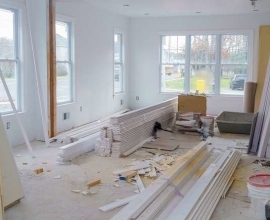Renovating Without a Permit a Costly Mistake
My husband and I dream of the day we can finish our basement. We would love to have the extra space to accommodate guests and for our kids to play. I fantasize about closets and storage space lining the walls for all of the kids’ toys and clothes. I always assumed that when we have the funds for the project it would be a simple matter of finding the right contractor to get the job done quickly. But there is an important part of taking on a home renovation that I had not considered – the building permit.
Of my many friends who have had their basements finished over the past few years, none have obtained a building permit first. They assumed that since the renovation did not extend beyond the existing walls of their home, they were free to make any changes they wished.
According to Ray Leclair, a real estate lawyer and vice-president of the TitlePLUS program at Lawyers’ Professional Indemnity Company (LawPRO), my friends have been breaking the law.
“It’s a municipal by-law under building code,” he says. “The impact of it is that there could be a fine for the homeowner or the municipality can say remove the structure or they’ll condemn the property.”
Most of us realize that major renovations such as building an addition to a home require a building permit. But I was surprised to learn that many smaller jobs may require one as well. These jobs include finishing basements, updating plumbing or electrical equipment, constructing a deck, or even adding a wood-burning stove. If you are making changes to partitions or load-bearing walls or changing the structure of doors or windows, you may need to apply for a permit as this kind of work could affect the structural integrity of your home.
Mr. Leclair has seen several situations in which new homeowners discover too late that the structure of a newly renovated house is not sound or that the electrical system has not been done to code and is creating a fire hazard.
“A dream home purchase can turn into a nightmare if you do not acquire the proper permits or if renovations were done by a previous owner without a permit. The municipality may force you to remove walls, ceilings, cabinets and other finishes so that an inspector can determine if the work complies with the building requirements or, in the worst case, remove the improvement entirely.”
Mr. Leclair acknowledges that there is a hassle involved in getting a building permit. You will need to provide the municipality with detailed plans of the renovation to the house and provide any additional documentation requested. An inspector will be engaged during the project to ensure that the work complies with building codes and regulations.
However, without a permit, you do risk the sale of your home in the future. Buyers could request that a permit be obtained for the work already done or ask for a price reduction because of the cost risk it presents to them. Without a permit for your renovation, a mortgage refinancing application may even be affected, Mr. Leclair warns.
Given that home renovations are more popular than ever, it pays to do them properly. Recent statistics released by the Canadian Mortgage and Housing Corporation revealed that 45 per cent of households intend to do some form of maintenance and repairs, while 78 per cent will undertake alterations and improvements. Sixty-eight per cent of the homeowners who intend to renovate this year will do so to update, add value or prepare to sell their home. None of us want to invest in a pricey update of our homes only to see it cost us more later.
If you are undertaking a renovation, check out your local municipality’s website for building permit information. You can also find a real estate lawyer to help you through the process at titleplus.ca.
If you are looking to buy a home that has had recent renovations, check with the city to see if a building permit was issued and that the structure was inspected and compliant. You can make your offer conditional on the availability of the permit.
“There’s no reason for this to kill a real estate deal,” Mr. Leclair says, “but it gives you the opportunity to walk away. Once you know there are potential problems, you can ask them for a reduction in the purchase price or let the vendor get the permit and satisfy the inspection.”
Source: https://tgam.ca/2k7hgHE







